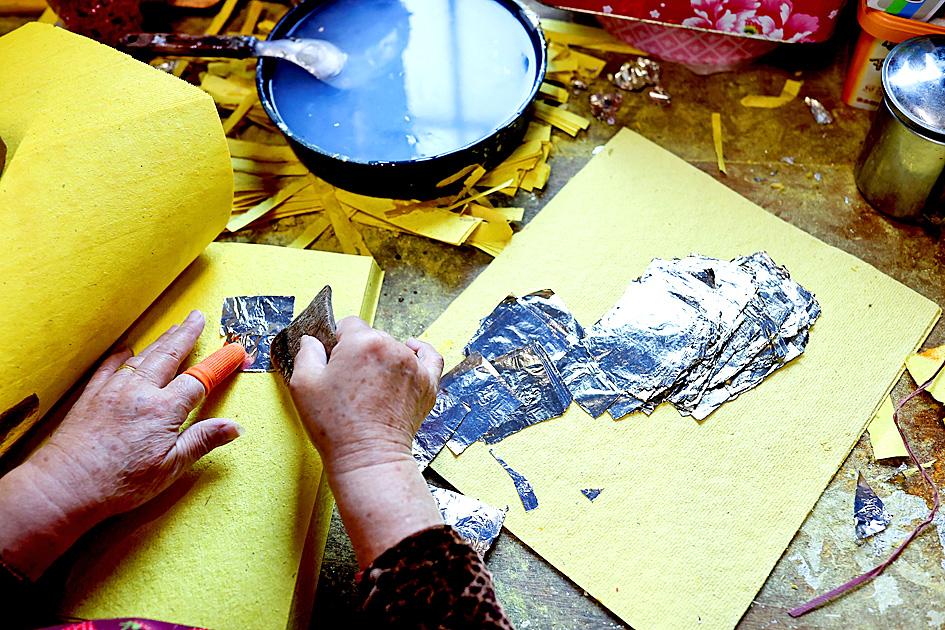Painstakingly, women of retirement age adorn sheet after sheet of yellow joss paper with gold and silver leaf and red paint to satisfy last orders for sacrificial cash offerings ahead of the Lunar New Year holiday.
Chen Kun-huei (陳坤輝), 82, is determined to keep alive an ancient tradition of making the “ghost money” by hand even as others have shifted to automated production at factories.
“I will continue making ghost money until I can’t move anymore,” said Chen, the third-generation owner of his family’s business in Miaoli County.

Photo: Ann Wang, Reuters
Altogether, the Chens have been making ghost money for about 100 years.
Also called joss paper in English, ghost money is one of the most common offerings in Taiwan, burned at temples and outside homes to honor deities and ancestors while praying for many children, prosperity and longevity.
It is used during all holidays in Taiwan — Chen says there is only one month of downtime in a year — with the most offerings made during Lunar New Year and Ghost Month, or the seventh month of the lunar calendar.
“There are just too many temples in Taiwan,” said Chen’s daughter, Chen Miao-fang (陳妙芳), explaining why demand for ghost money remains high.
After growing up in and around the workshop, Chen Miao-fang is now in charge of taking orders.
The Chens’ way of making ghost money is fading quickly due to a lack of people willing to do the repetitive work and competition from big commercial printers producing cheaper, colorful alternatives.
Only a few other workshops also still make the sacrificial paper by hand.
“In the future this might all be replaced by machines,” Chen Miao-fang said, looking around wistfully at the family’s small-scale operation.
For now, the Chens have a loyal base of customers who value the high quality of their product.
The week-long Lunar New Year holiday begins on Saturday.

MULTIFACETED: A task force has analyzed possible scenarios and created responses to assist domestic industries in dealing with US tariffs, the economics minister said The Executive Yuan is tomorrow to announce countermeasures to US President Donald Trump’s planned reciprocal tariffs, although the details of the plan would not be made public until Monday next week, Minister of Economic Affairs J.W. Kuo (郭智輝) said yesterday. The Cabinet established an economic and trade task force in November last year to deal with US trade and tariff related issues, Kuo told reporters outside the legislature in Taipei. The task force has been analyzing and evaluating all kinds of scenarios to identify suitable responses and determine how best to assist domestic industries in managing the effects of Trump’s tariffs, he

TIGHT-LIPPED: UMC said it had no merger plans at the moment, after Nikkei Asia reported that the firm and GlobalFoundries were considering restarting merger talks United Microelectronics Corp (UMC, 聯電), the world’s No. 4 contract chipmaker, yesterday launched a new US$5 billion 12-inch chip factory in Singapore as part of its latest effort to diversify its manufacturing footprint amid growing geopolitical risks. The new factory, adjacent to UMC’s existing Singapore fab in the Pasir Res Wafer Fab Park, is scheduled to enter volume production next year, utilizing mature 22-nanometer and 28-nanometer process technologies, UMC said in a statement. The company plans to invest US$5 billion during the first phase of the new fab, which would have an installed capacity of 30,000 12-inch wafers per month, it said. The

‘SWASTICAR’: Tesla CEO Elon Musk’s close association with Donald Trump has prompted opponents to brand him a ‘Nazi’ and resulted in a dramatic drop in sales Demonstrators descended on Tesla Inc dealerships across the US, and in Europe and Canada on Saturday to protest company chief Elon Musk, who has amassed extraordinary power as a top adviser to US President Donald Trump. Waving signs with messages such as “Musk is stealing our money” and “Reclaim our country,” the protests largely took place peacefully following fiery episodes of vandalism on Tesla vehicles, dealerships and other facilities in recent weeks that US officials have denounced as terrorism. Hundreds rallied on Saturday outside the Tesla dealership in Manhattan. Some blasted Musk, the world’s richest man, while others demanded the shuttering of his

Taiwan’s official purchasing managers’ index (PMI) last month rose 0.2 percentage points to 54.2, in a second consecutive month of expansion, thanks to front-loading demand intended to avoid potential US tariff hikes, the Chung-Hua Institution for Economic Research (CIER, 中華經濟研究院) said yesterday. While short-term demand appeared robust, uncertainties rose due to US President Donald Trump’s unpredictable trade policy, CIER president Lien Hsien-ming (連賢明) told a news conference in Taipei. Taiwan’s economy this year would be characterized by high-level fluctuations and the volatility would be wilder than most expect, Lien said Demand for electronics, particularly semiconductors, continues to benefit from US technology giants’ effort